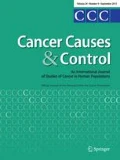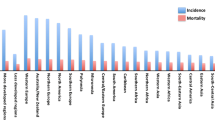Abstract
Objective
With 2.3 million breast cancer survivors in the US today, identification of modifiable factors associated with breast cancer recurrence and survival is increasingly important. Only recently new studies have been designed to examine the impact of lifestyle factors on prognosis, including Pathways, a prospective study of women with breast cancer in Kaiser Permanente Northern California (KPNC).
Methods
Pathways aims to examine the effect on recurrence and survival of (1) lifestyle factors such as diet, physical activity, quality of life, and use of alternative therapies and (2) molecular factors such as genetic polymorphisms involved in metabolism of chemotherapeutic agents. Eligibility includes any woman diagnosed with invasive breast cancer within KPNC, no previous diagnosis of other invasive cancer, age 21 years or older, and ability to speak English, Spanish, Cantonese, or Mandarin. Newly diagnosed patients are identified daily from electronic pathology records and are enrolled within two months of diagnosis. An extensive baseline interview is conducted, blood and saliva samples are collected, and body measurements are taken. Women are followed for lifestyle updates, treatment, and outcomes by self-report and query of KPNC databases.
Results
Recruitment began in 9 January, 2006, and as of 16 January, 2008, 1,539 women have been enrolled along with collection of 1,323 blood samples (86%) and 1,398 saliva samples (91%).
Conclusions
The Pathways Study will become a rich resource to examine behavioral and molecular factors and breast cancer prognosis.

Similar content being viewed by others
References
http://www.cancer.org, American Cancer Society. 2006
Ambrosone CB, Rebbeck TR, Morgan GJ et al (2006) New developments in the epidemiology of cancer prognosis: traditional and molecular predictors of treatment response and survival. Cancer Epidemiol Biomarkers Prev 15(11):2042–2046. doi:10.1158/1055-9965.EPI-06-0827
Kushi LH, Kwan ML, Lee MM, Ambrosone CB (2007) Lifestyle factors and survival in women with breast cancer. J Nutr 137(1 Suppl):236S–242S
Rock CL, Demark-Wahnefried W (2002) Can lifestyle modification increase survival in women diagnosed with breast cancer? J Nutr 132(11 Suppl):3504S–3507S
Rock CL, Demark-Wahnefried W (2002) Nutrition and survival after the diagnosis of breast cancer: a review of the evidence. J Clin Oncol 20(15):3302–3316. doi:10.1200/JCO.2002.03.008
World Cancer Research Fund/American Institute for Cancer Research (2007) Food, nutrition, physical activity, and the prevention of cancer: a global perspective. AICR, Washington, DC
Fisher B, Anderson S, Bryant J et al (2002) Twenty-year follow-up of a randomized trial comparing total mastectomy, lumpectomy, and lumpectomy plus irradiation for the treatment of invasive breast cancer. N Engl J Med 347(16):1233–1241. doi:10.1056/NEJMoa022152
Fisher B, Jeong JH, Bryant J et al (2004) Treatment of lymph-node-negative, oestrogen-receptor-positive breast cancer: long-term findings from National Surgical Adjuvant Breast and Bowel Project randomised clinical trials. Lancet 364(9437):858–568. doi:10.1016/S0140-6736(04)16981-X
Carlson RW, Brown E, Burstein HJ et al (2006) NCCN Task Force Report: adjuvant therapy for breast cancer. J Natl Compr Canc Netw 4(Suppl 1):S1–S26
Buyse M, Loi S, van’t Veer L et al (2006) Validation and clinical utility of a 70-gene prognostic signature for women with node-negative breast cancer. J Natl Cancer Inst 98(17):1183–1192
Paik S, Shak S, Tang G et al (2004) A multigene assay to predict recurrence of tamoxifen-treated, node-negative breast cancer. N Engl J Med 351(27):2817–2826. doi:10.1056/NEJMoa041588
Doyle C, Kushi LH, Byers T et al (2006) Nutrition and physical activity during and after cancer treatment: an American Cancer Society guide for informed choices. CA Cancer J Clin 56(6):323–353
Centers for Disease Control and Prevention NCfHS (1999–2000) National Health and Nutrition Examination Survey. NHANES 1999–2000 Public Data Release File Documentation, Available at: http://www.cdc.gov/nchs/data/nhanes/gendoc.pdf
Centers for Disease Control and Prevention NCfHS (2000–2001) National Health and Nutrition Examination Survey. NHANES 2001–2002 Public Data General Release File Documentation. Available at: http://www.cdc.gov/nchs/data/nhanes/nhanes_01_02/general_data_release_doc.pdf
U.S. Department of Agriculture ARS (2006) USDA food and nutrient database for dietary studies 2.0
Schakel SF, Buzzard IM, Gebhardt SE (1997) Procedures for estimating nutrient values for food composition databases. J Food Composition Anal. 10:102–114. doi:10.1006/jfca.1997.0527
Schakel SF, Sievert YA, Buzzard IM (1988) Sources of data for developing and maintaining a nutrient database. J Am Diet Assoc 88(10):1268–71
Bair YA, Gold EB, Greendale GA et al (2002) Ethnic differences in use of complementary and alternative medicine at midlife: longitudinal results from SWAN participants. Am J Public Health 92(11):1832–1840
Lee MM, Lin SS, Wrensch MR, Adler SR, Eisenberg D (2000) Alternative therapies used by women with breast cancer in four ethnic populations. J Natl Cancer Inst 92(1):42–47. doi:10.1093/jnci/92.1.42
Pierce JP, Faerber S, Wright FA et al (2002) A randomized trial of the effect of a plant-based dietary pattern on additional breast cancer events and survival: the Women’s Healthy Eating and Living (WHEL) Study. Control Clin Trials 23(6):728–756. doi:10.1016/S0197-2456(02)00241-6
Gammon MD, Neugut AI, Santella RM et al (2002) The Long Island Breast Cancer Study Project: description of a multi-institutional collaboration to identify environmental risk factors for breast cancer. Breast Cancer Res Treat 74(3):235–254. Medline doi:10.1023/A:1016387020854
Caan B, Sternfeld B, Gunderson E, Coates A, Quesenberry C, Slattery ML (2005) Life After Cancer Epidemiology (LACE) Study: a cohort of early stage breast cancer survivors (United States). Cancer Causes Control 16(5):545–556. doi:10.1007/s10552-004-8340-3
Staten LK, Taren DL, Howell WH et al (2001) Validation of the Arizona activity frequency questionnaire using doubly labeled water. Med Sci Sports Exerc 33(11):1959–1967. doi:10.1097/00005768-200111000-00024
Brady MJ, Cella DF, Mo F et al (1997) Reliability and validity of the functional assessment of cancer therapy-breast quality-of-life instrument. J Clin Oncol 15(3):974–986
Cella D, Peterman A, Hudgens S, Webster K, Socinski MA (2003) Measuring the side effects of taxane therapy in oncology: the functional assesment of cancer therapy-taxane (FACT-taxane). Cancer 98(4):822–831. doi:10.1002/cncr.11578
Radloff LS (1977) The CES-D scale: a self-report depression scale for research in the general population. Appl Psychol Meas 1:385–401. doi:10.1177/014662167700100306
Scheier MF, Carver CS (1985) Optimism, coping, and health: assessment and implications of generalized outcome expectancies. Health Psychol 4(3):219–247. doi:10.1037/0278-6133.4.3.219
Neighbors HW, Jackson JS, Bowman PJ, Gurin G (1983) Stress, coping, and Black mental health: preliminary findings from a national study. Prev Hum Serv 2(3):5–29
Krieger N, Smith K, Naishadham D, Hartman C, Barbeau EM (2005) Experiences of discrimination: validity and reliability of a self-report measure for population health research on racism and health. Soc Sci Med 61(7):1576–1596. doi:10.1016/j.socscimed.2005.03.006
Chew LD, Bradley KA, Boyko EJ (2004) Brief questions to identify patients with inadequate health literacy. Fam Med 36(8):588–594
Stewart AL, Napoles-Springer AM, Gregorich SE, Santoyo-Olsson J (2007) Interpersonal processes of care survey: patient-reported measures for diverse groups. Health Serv Res 42(3 Pt 1):1235–1256. doi:10.1111/j.1475-6773.2006.00637.x
Llewellyn-Thomas HA, McGreal MJ, Thiel EC, Fine S, Erlichman C (1991) Patients’ willingness to enter clinical trials: measuring the association with perceived benefit and preference for decision participation. Soc Sci Med 32(1):35–42. doi:10.1016/0277-9536(91)90124-U
O’Malley AS, Sheppard VB, Schwartz M, Mandelblatt J (2004) The role of trust in use of preventive services among low-income African-American women. Prev Med 38(6):777–785. doi:10.1016/j.ypmed.2004.01.018
Sherbourne CD, Stewart AL (1991) The MOS social support survey. Soc Sci Med 32(6):705–714. doi:10.1016/0277-9536(91)90150-B
Oehrli MD, Quesenberry CP, Leyden W (2006) Annual report on trends, incidence, and outcomes. 2006, Kaiser Permanente, Northern California Cancer Registry
Irwin ML, McTiernan A, Bernstein L et al (2004) Physical activity levels among breast cancer survivors. Med Sci Sports Exerc 36(9):1484–1491
Lu W, Cui Y, Zheng Y et al (2007) Impact of newly diagnosed breast cancer on quality of life among Chinese women. Breast Cancer Res Treat 102(2):201–210. doi:10.1007/s10549-006-9318-5
Jacobson JS, Workman SB, Kronenberg F (2000) Research on complementary/alternative medicine for patients with breast cancer: a review of the biomedical literature. J Clin Oncol 18(3):668–683
Bloechl-Daum B, Deuson RR, Mavros P, Hansen M, Herrstedt J (2006) Delayed nausea and vomiting continue to reduce patients’ quality of life after highly and moderately emetogenic chemotherapy despite antiemetic treatment. J Clin Oncol 24(27):4472–4478. doi:10.1200/JCO.2006.05.6382
Macquart-Moulin G, Viens P, Bouscary ML et al (1997) Discordance between physicians’ estimations and breast cancer patients’ self-assessment of side-effects of chemotherapy: an issue for quality of care. Br J Cancer 76(12):1640–1645
Miller M, Kearney N (2004) Chemotherapy-related nausea and vomiting–past reflections, present practice and future management. Eur J Cancer Care (Engl) 13(1):71–81. doi:10.1111/j.1365-2354.2004.00446.x
McWayne J, Heiney SP (2005) Psychologic and social sequelae of secondary lymphedema. Cancer 104(3):457–466. doi:10.1002/cncr.21195
Acknowledgements
We thank all Pathways Study office and field staff, and most importantly, the participants. The Pathways Study is supported by the National Cancer Institute (R01 CA105274). The ancillary studies are supported by the U.S. Department of Defense (BC043120), American Cancer Society (RSG-06-209-01-LR), and National Cancer Institute (R01 CA124924). The contents are solely the responsibility of the authors and do not necessarily represent the official views of the funding agencies.
Author information
Authors and Affiliations
Corresponding author
Rights and permissions
About this article
Cite this article
Kwan, M.L., Ambrosone, C.B., Lee, M.M. et al. The Pathways Study: a prospective study of breast cancer survivorship within Kaiser Permanente Northern California. Cancer Causes Control 19, 1065–1076 (2008). https://doi.org/10.1007/s10552-008-9170-5
Received:
Accepted:
Published:
Issue Date:
DOI: https://doi.org/10.1007/s10552-008-9170-5




